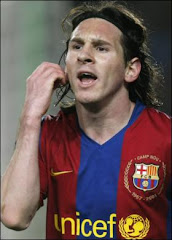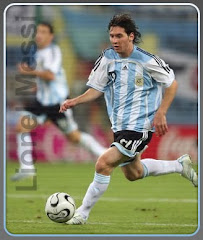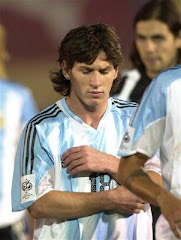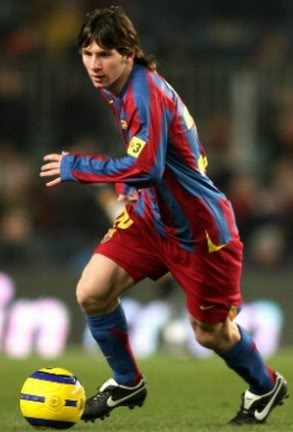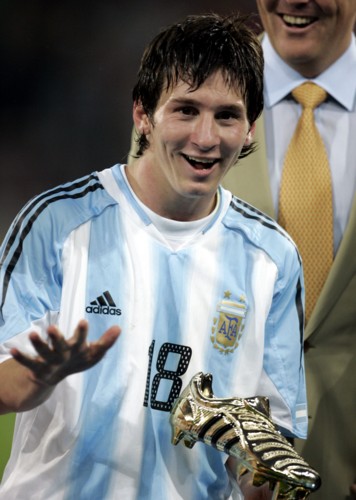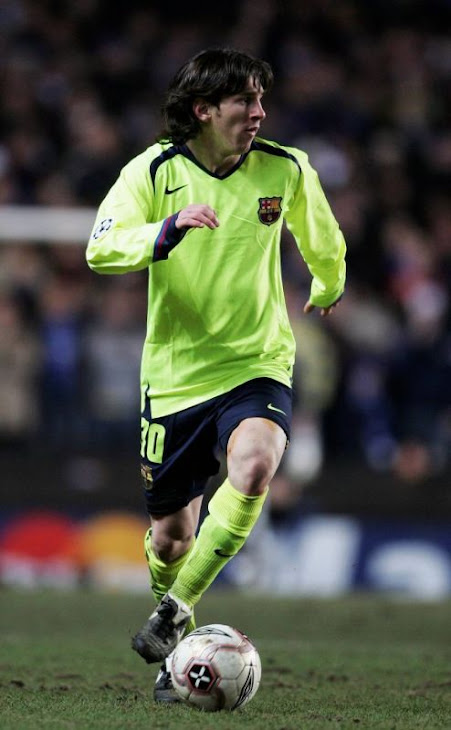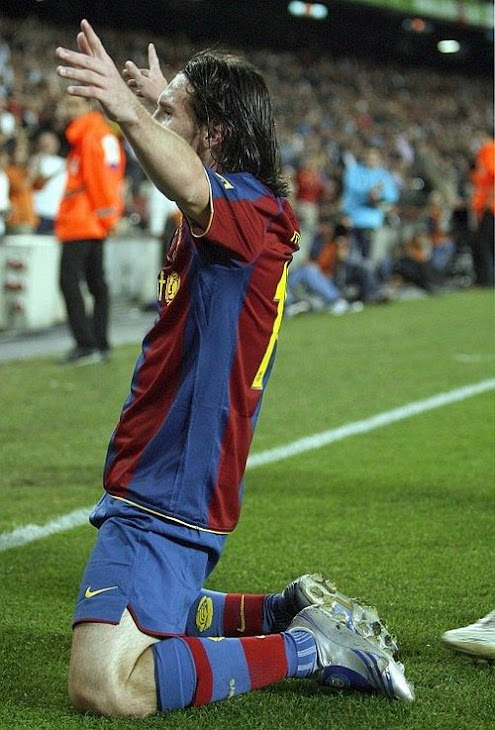
Barcelona-
Messi made his unofficial debut for the first team in a friendly match against Porto on 16 November 2003 (at 16 years and 145 days). Less than a year later, Frank Rijkaard let him make his league debut against Espanyol on 16 October 2004 (at 17 years and 114 days), becoming the third-youngest player ever to play for Barcelona and youngest club player who played in La Liga (a record broken by team mate Bojan Krkic in September 2007). When he scored his first senior goal for the club against Albacete on 1 May 2005, Messi was 17 years, 10 months and 7 days old, becoming the youngest to ever score in a La Liga game for Barcelona until 2007 when Bojan Krkić broke this record, scoring from a Messi assist.
2009-2010 Season-
After winning the 2009 UEFA Super Cup, Barcelona manager Josep Guardiola asserted that Messi was probably the best player he had ever seen.
On 18 September, Messi signed a new contract with Barcelona, running until 2016 and with a buy-out clause of €250 million included, making Messi, along with Zlatan Ibrahimovic, the highest paid players in La Liga, with earnings of around €9.5 million yearly. Four days later, on 22 September, Messi scored two goals and assisted another in Barça's 4–1 win over Racing Santander in La Liga. Messi scored his first European goal of the season on 29 September in a 2–0 win over Dynamo Kyiv. Messi took his goal tally to six goals in seven games in La Liga with a strike during a 6–1 rout over Real Zaragoza at Camp Nou, and also scored a penalty in Barça's 4–2 win over Mallorca at the Camp Nou on 7 November. On 1 December 2009, Messi was named winner of the 2009 Ballon d'Or, beating runner-up Cristiano Ronaldo by largest ever margin of 473 to 233. Afterwards, France Football magazine quoted Messi as saying: "I dedicate it to my family. They were always present when I needed them and sometimes felt even stronger emotions than me."
On 19 December, Messi scored the winner in the final of the 2009 FIFA Club World Cup against Estudiantes in Abu Dhabi, and thus giving the club their sixth title of the year. Two days later, he was given the FIFA World Player of the Year award; beating Cristiano Ronaldo, Xavi, Kaká and Andrés Iniesta to the award. This was the first time he had won the award, and he became the first Argentinean to ever receive this honour. On 10 January 2010, Messi scored his first hat-trick in 2010 and his first hat-trick of the season against tenerife in the 0–5 victory. On 17 January, Messi scored his 100th goal for the club in the 4–0 victory over Sevilla.
2008-2009 Season-
Upon Ronaldinho's departure from the club, Messi inherited his number 10 jersey. On 1 October 2008, during a Champions League match against Shakhtar Donetsk, Messi scored two goals during the last seven minutes, after coming on as a substitute for Thierry Henry, to turn the score from 1–0 to a 1–2 victory for Barcelona. The next league game was versus Atletico Madrid, a match billed as a friendly battle between Messi and his good friend Sergio Aguero. Messi scored a goal from a free kick and assisted another as Barça went on to win the match 6–1. Messi netted another impressive brace against Sevilla scoring a volley from 23 metres (25 yd) and then dribbbling round the goalkeeper and scoring from a tight angle for the other. On 13 December 2008, during the first Clásico of the season, Messi scored the second goal in Barcelona's 2–0 win over Real Madrid. He was also named second in the 2008 FIFA World Player of the Year awards with 678 points.
Messi scored his first hat-trick of 2009 in a Copa del Rey tie against Atlético Madrid which Barcelona won 3–1. Messi scored another important double on 1 February 2009, coming on as a second half substitute to help Barcelona defeat Racing Santander 1–2 after being 1–0 down. The second of the two strikes was Barcelona's 5000th league goal. In the 28th round of La Liga, Messi scored his 30th goal of the season in all competitions, helping his team to a 6–0 victory over Malaga CF in the process. On 8 April 2009, he scored twice against Bayern Munich in the Champions' League, setting a personal record of eight goals in the competition. On 18 April, Messi notched his 20th league goal of the season in a 1–0 win at Getafe, allowing Barcelona to maintain their six point advantage at the top of the league table over Real Madrid. On 27 May he helped Barcelona win the 2009 UEFA Champions League Final by scoring a second goal in the 70th minute giving Barcelona a two goal lead; he also became the top scorer in the Champions League—the youngest in the tournament's history—with nine goals. Messi also won the UEFA Club Forward of the Year and the UEFA Club Footballer of the Year rounding off a spectacular year in Europe. This victory meant Barcelona had won the Copa del Rey, La Liga and UEFA Champions League in the one season, and was the first time a Spanish club had ever won the trebel.
2007-2008-
During the 2007–08 season, Messi scored five goals in a week leading Barcelona to the top four in La Liga. On 19 September he scored once as Barcelona defeated OlympiqueLyonnais 3–0 at home in a Champions League match. He scored two goals against Sevillaon 22 September[ and then on 26 September, Messi scored another two goals in a 4–1 victory over Real Zaragoza. On 27 February, Messi played in his 100th official match forBarça against Valencia.
He was nominated for a FIFPro World XI Player Award under the category of Forward. A poll conducted in the online edition of the Spanish newspaper Marca had him as the best player in the world with 77 percent of the vote. Columnists from Barcelona-based newspapers El Mundo Deportivo and Sport stated that the Ballon d'Or should be given to Messi, a view supported by Franz Beckenbauer. Football personalities such as Francesco Totti have declared that they consider Messi to be one of the current best footballers in the world.
Messi was sidelined for six weeks following an injury on 4 March when he suffered a muscle tear in his left thigh during a Champions League match against Celtic. It was the fourth time in three seasons that Messi suffered this type of injury.
2005-2006-
On 16 September, for the second time in three months, Barcelona announced an update to Messi's contract; this time it was improved to pay him as a first team member and extended until June 2014. Messi obtained Spanish citizenship on 26 September 2005 and was finally able to make his debut in the season 's Spanish First Division. Messi's first home outing in the UEFA Champions League came on 27 September against Italian club Udinese. Fans atBarcelona's stadium, the Camp Nou, gave Messi a standing ovation upon his substitution, as his composure on the ball and passing combinations with Ronaldinho had paid dividends for Barcelona.
Messi netted six goals in seventeen league appearances, and scored one Champions League goal in six. His season ended prematurely on 7 March 2006, however, when he suffered a muscle tear in his right thigh during the second leg of the second round Champions League tie against Chelsea. Frank Rijkaad's Barcelona ended the season as champions of Spain and Europe.










